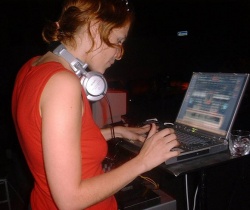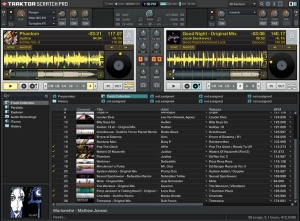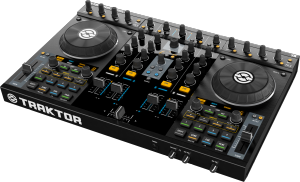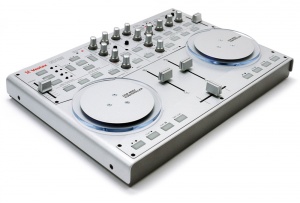Digital DJing
Contents
History of DJing
In 1973, DJ Kool Herc became the first true 'DJ' in the modern sense of the term. He is credited with being the first person to seamlessly blend tracks together in an effort to avoid awkward breaks in between songs. About a year later, Technics released the legendary Sl-1200s, which are the industry standards even to this today. Later in 2003, Stanton and Native Instruments released FinalScratch, which is the first commercially available Digital Vinyl System.
Vinyl versus Digital
Vinyl records are widely considered to have better sound quality than current digital music formats. It is easier to fine-tune the sound from vinyl, and many describe the sound as more "organic."[1] Furthermore, some older records are inexpensive. On the other hand, the equipment necessary to play vinyl records can be very expensive, is less portable, and requires regular maintenance. [1]
One of the biggest advantages of digital music is portability. Digital music can be stored on very small devices and can also be cheaper per song than vinyl. It is much easier to carry a large collection of music in a digital format than as vinyl. For DJs, this is all advantageous for ease of use. Some cons of digital music include a fixed audio quality and no resale value. [2]
Traditional DJ Setups
Without a Computer
2 Vinyl Turntables (needle/cartridge/slipmat) + Mixer + vinyl collection 2 CD Turntables + Mixer + CD collection
With a Computer
DVS (Digital Vinyl System) w/ old equipment USB Controller iTunes/other software
Popular DJ Software
1. Ableton Live
2. Virtual DJ
3. Serato
4. Traktor
5. Deckadance
6. Torq
Software
Some popular computer DJ software includes
- Ableton Live
- Final Scratch
- DJ Mixer Software
- MegaSeg
- Mixmeister
- Torq
Digital DJing with Controllers
In the age of digital DJing, USB MIDI Controllers have become one of the most popular options. With the all-in-one solution, it gives new DJ's a simple and easy solution to start DJing without breaking the bank.
Native Instruments
Native Instruments has become a leading company in both the digital and analog worlds of DJing. In terms of software, it offers Traktor Pro and Traktor Scratch. Traktor Pro is geared towards DJ's who use controllers while Traktor Scratch focuses on the DJ who uses a DVS system.
Traktor
Currently, the software is in the 2.0 build. The software makes it possible for users to do a stripped down set of mixing one track to the next or by implementing loops, samples and a bank of FX that creates endless possibilities. As convenient as this software sounds, several "traditional" vinyl DJ's find it to be a gimmick that has spawned a large following of trivial, lacking DJ's. The main reason being that the software offers a feature called "SYNC," which allows the user to line up songs in near perfect beat making their job easier than using the traditional style of beatmatching songs by ear.
Controllers
S4
The S4 is looked upon as a standard in the controllerism world. The unit boasts control over 4-decks, cue point triggers, loop recorders, a 4-channel mixer along with a built-in sound card. The drawback to a number of controllers is that they do not have a built-in sound card forcing DJ's to purchase yet another piece of equipment yet this is not the case with the S4. It comes with a hefty price tag but gives users a "bang for their buck" package allowing a plug-and-play experience directly out of the box.
VCI-100
Another well-known controller in the digital world is the Vestax VCI-100. The controller was discontinued by the company a few years ago but recently has been offered through the website DJ Tech Tools. Since the website began offering the product, they renamed it the VCI-100 SE with each unit being hand built by people affiliated with the website. In comparison to the S4, it does not have as many bells and whistles but can be learned and tweaked through the custom mappings around the internet that give owners of the product endless freedom and possibilities. It allows for 2-deck control with the option to switch to the other two decks, loop control as well as recording and a creative option know as Fader FX mode. This mode allows users to group up to three different effects and manipulate them through the use of the volume fader for that deck, the corresponding jog wheel and volume levels for the FX bank used.
Ethics of Digital DJing
Given the ability to "mash-up" thousands of songs readily available from one's music library on the computer, copyright laws and permission to modulate a track usually aren't a top priority for DJs, especially for those who haven't made a name for themselves yet. Despite the illegality of remixing copyrighted tracks, many music sites rely upon hosting user created content, such as PodOmatic and SoundCloud - which are popular with upcoming DJs and those interested in the mixing scene.
Copyright Issues
To counter the negative implications of possibly infringing upon copyrighted material by having it played publicly to popularize new and upcoming DJs, some artists such as Armin van Buuren, Above & Beyond, Tiesto host weekly radio shows that feature a DJ's mix without negative repercussions due to deals with record labels. Online radio hosting such as DI Radio also provides many "genres" of electronic music produced by DJs, both well known and unknown to play, free of charge.
See Also
References
1. http://createdigitalmusic.com/2008/04/ni-ends-legal-dispute-over-traktor-scratch-digital-vinyls-twisty-turny-history/#more-3386
2. http://who-invented-digital-vinyl.co.uk/



